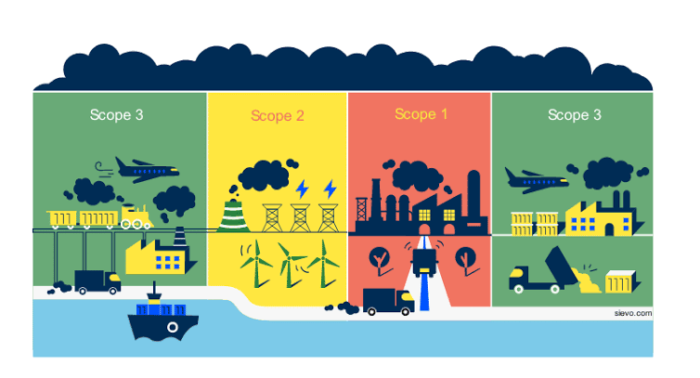While Rising carbon emissions and
greenhouse gases are the major reason
for climate crisis . there are three more
reasons which are not given enough
attention , and are heavily contributing
to the significant climate change . while
scientists are on the way working to
reach the global 1.5 degrees Celsius
threshold. the real taste lies in our
ability to cut scope 3 emissions.
now let’s get to know what scope 3
emissions are , the term first appeared in
the greenhouse gas protocol of 2001, and
today’s Scopes are the basis for
mandatory greenhouse gas reporting . in
the United Kingdom.,.if you’re hearing
about scope one two and three emissions
for the first time . it’s highly unlikely
that it will be the last . now the term
scope is divided into three categories
of emissions scope one are the emissions
that cover the ghg emissions , that a
company produces directly. for example
producing ghd gases while running
boilers or Vehicles emissions , which are
produced indirectly like while producing
electricity or energy. it buys for
heating and cooling buildings are scoped
two emissions , and lastly the most tricky
ones are scope 3 emissions .
now these
emissions are not only associated with
the company itself but also the
organization , which is directly
responsible for the ups and downs in
their value chain. taking for instance,
company buying external products from
its suppliers and from its products when
customers use them , out of all the three
emissions scope 3 is nearly always the
big one . while our goal is to reduce ghg
emissions per consumer use of our
products by 2030. the United Nations in
turn also warns that the world’s ghg
emissions are still said to be 10
percent higher in 2030, in comparison to
- while scope 1 and 2 are mostly
within the organization’s control, what
dominates the most are scope 3 emissions.
which are directly accountable for more
than 70 percent of a business’s carbon
footprint.
unfortunately because they contribute
the most , these aren’t generally reported
on environmental social and governance
reports, because of which it is creating
difficulties to reach the desired
climate Target.
committing to reach Net Zero , while
tackling the scope 3 emissions several
companies are now addressing the issue,
and also contributing to map emissions
footprint by scale . although for many
companies most of their ghg emissions
and cost reduction opportunities lie
outside their own operations. in such an
environment of co-creation businesses
are now planning to work together to
identify improvements in Supply Chain
management , cost reductions, new and
Innovative products and services.
this then helps consumers to distinguish
genuine industry Visionaries and
disruptors from the broader industry
pack. as we do not have a lot of time in
our hands, many major industry players
have already started to make serious
decisions , around how they will pivot to
deal with and benefit from scope 3
emissions planning , because the strategic
planning process will be the key to
assess . where a business sits relative to
its peers and how innovators can move
quickly to take the lead ,and prosper
from the seismic shift in Emissions
Control.
ALSO READ THIS: Silting Threatens Storage Capacity Of Dams | Climate Change

